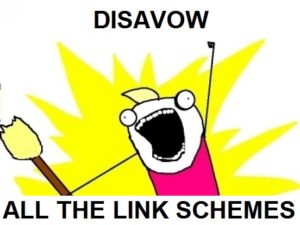Ethical Analysis of Link Removal Ransoms
If you have performed link removal outreach, you have received an email asking for payment to remove the link, directory listing, content from a blog/article site, etc.
The real question here is: Should I pay a webmaster to remove a link to my site?
The short answer is no.
You should not pay these webmasters to remove links, as per Google’s John Mueller (video):
“If [the link] is something that you want to have removed just for Google’s indexing and crawling then probably it’s ok just to list it in the disavow file. On the other hand, if it is something you want to have removed from the web completely and you don’t want to have this reference on the web for your website then maybe you can talk to those webmasters to see what you can do about having those things removed.”
Mueller’s answer is somewhat ambiguous, as he states that if you REALLY want the link removed, “maybe you can talk to those webmasters to see what you can do about having those things removed.”
This is slightly reminiscent of the Mug Shot fiasco last year, but many of these websites hold these links for ransom. The logic behind paying a link removal ransom would be that the webmaster was paid a certain amount of money to place the link, so they expect payment to remove the link as well.
At times, you may find several hundred, even thousands, of links within one network of sites; the most infamous of these being the 4700+ “SEO Friendly Directories” owned by Robin Gupta (or Vikas Kumar, or whomever he has do his dirty work now). We have had countless clients who have emailed [email protected] (which is now [email protected]), only to find out that there are several hundred links in his network that were not in any other link data sources.
This raises a few more questions:
Did these links exist before I contacted the webmaster?
Or were they placed to inflate the price of $5 per link?
We have to rely on the goodwill of mankind to ensure that link extortion does not happen. However, most of us are aware that there are morally compromised individuals that exist in the SEO-world that perform negative SEO, hacking, and other less-than-exemplary tactics to make a quick buck, so there’s nothing preventing these networks from doing something similar.
Where did these SEO-Friendly Directories and other sites originate?
Many webmasters will begin the process of building out a back-link profile by listing their site on several business-related or niche directories. Many SEOs over the past several years will tell their clients that getting their site listed in related directories is the first step in building a robust backlink profile. However, many SEOs have taken this to the extreme and list their clients’ sites on hundreds of these directories, even unrelated ones.
The increase in demand for these directories made it possible for people to create networks of these sites to profit from uninformed webmasters that were attempting to market their sites to search engines.
In addition to low-quality directories, there is a multitude of network-type sites that have been abused over the past few years for SEO-linking purposes. These sites include:
- Article syndication websites
- Social bookmarking sites
- Blog networks
- “Affiliate” programs
- And anything else listed in Google’s link schemes post.
What should I do in response to these link removal ransoms?
Disavowing these websites is the best option and providing Google with the documentation that shows these webmasters have asked for payment. For website owners with a Google penalty, keep very good notes in terms of who responds and asks for monetary compensation to remove links to your site.
If you are on a crusade to clean up bad back-links no matter the cost, it may be beneficial to both parties to pay them for their time removing the link. Pricing of removal ransoms varies from webmaster to webmaster. We have had several requests that have asked for anywhere from $2 to $25. The most outlandish response received was a request for $5000 to remove an article. When in doubt:

If you need help with a Google penalization and suspect you may fall victim to these exploitative webmasters, please contact us at [email protected]!
WEB ANALYTICS | SEARCH OPTIMIZATION | PAID ADVERTISING | COMPANY NEWS

[email protected] Vhikas Kumar is asking 5 dollars to remove my links from his website.
I hired a webmaster to help removing this links and he informed me about these.
I don’t know if I have pay or if a disavow will be enough.
Boris
Hey Boris,
My suggestion (and Google’s) is to disavow ALL of Vhikas Kumar’s websites which have links to you. Paying these people only supports their ransoming endeavors and validates the work that they do. By restricting payment to people like Vhikas, you are going to prevent him from getting more money to pay for hosting for his sites, so one day, they will all simply disappear, and the entire Internet will be better for it. I have no love for link ransomers, so I will reiterate, DO NOT PAY THEM!
If you have a manual penalty, be sure to explain in your reconsideration request about the webmaster who requested payment to remove the links, and your subsequent disavowal of all of their websites.
Cheers,
Tripp